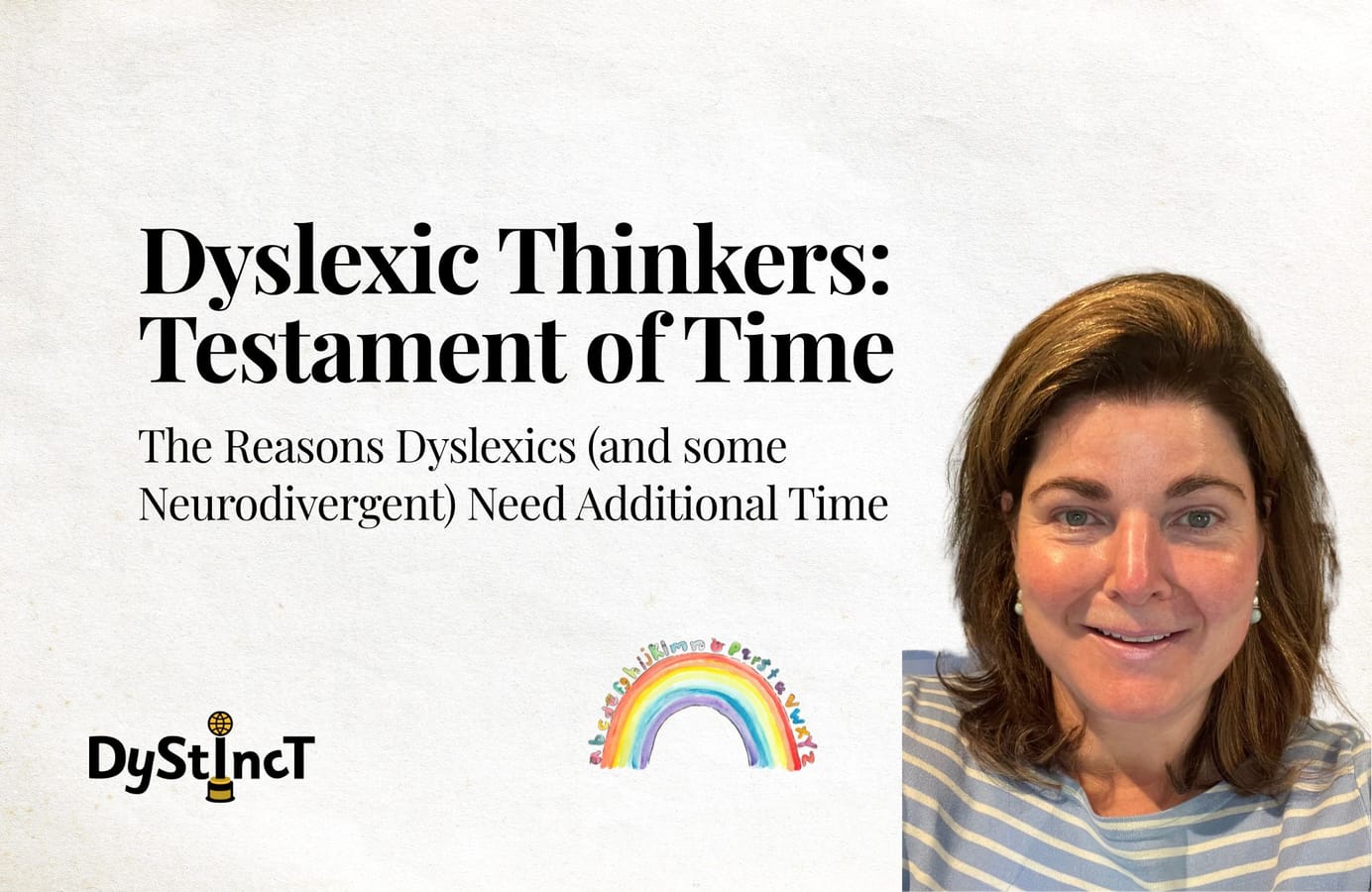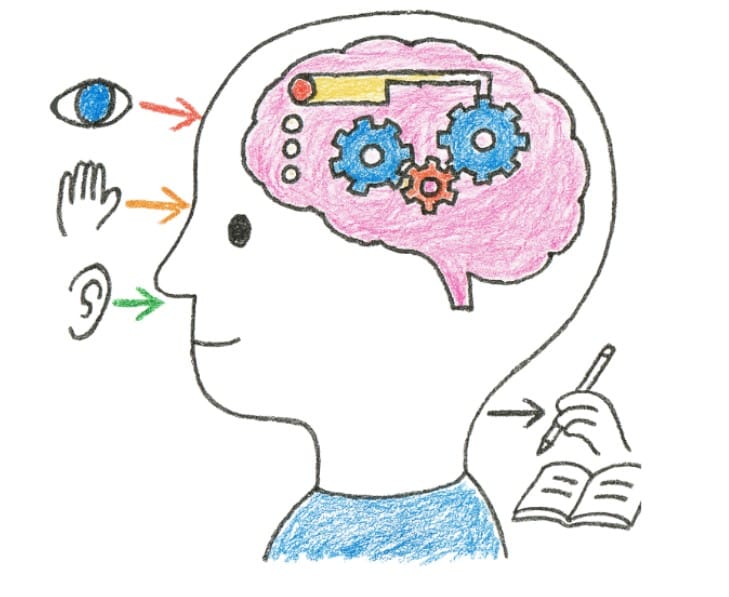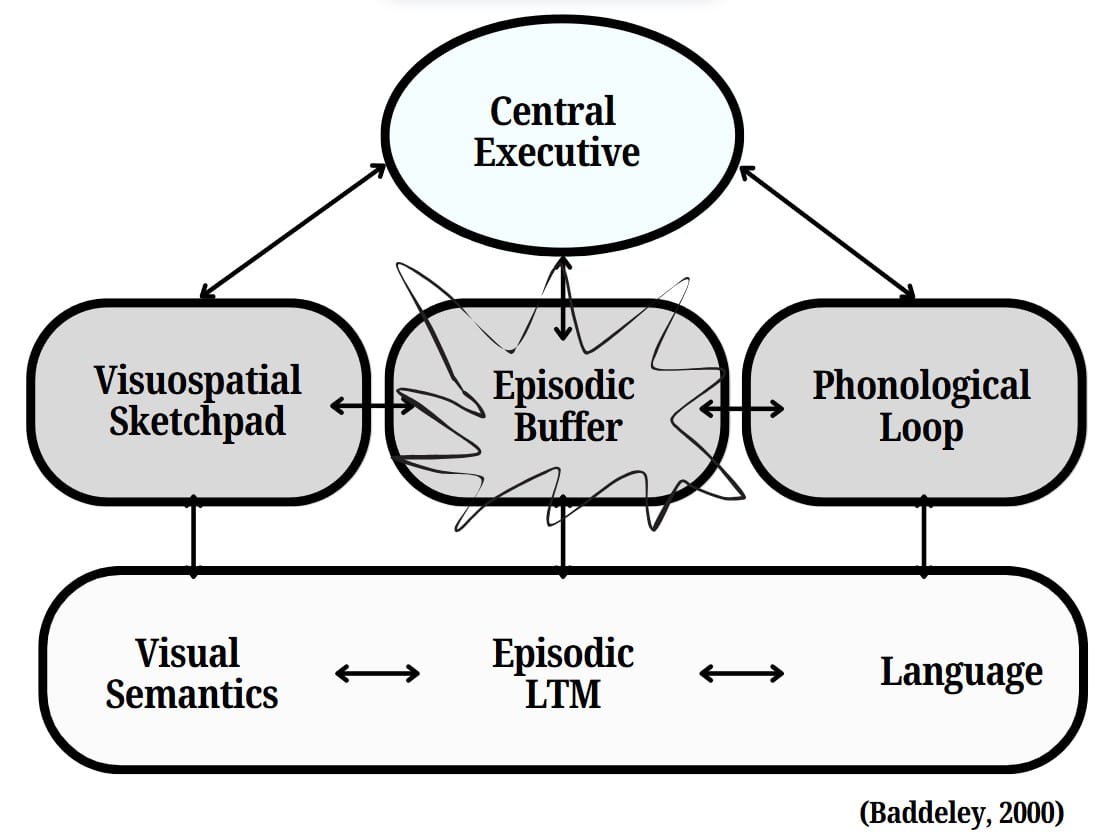
Issue 26: Dyslexic Thinkers: Testament of Time - The Reasons Dyslexics (and some Neurodivergent) Need Additional Time | Georgie Cooney | Dyslexia Spell
Georgie Cooney, dyslexia specialist, explains why additional time is essential for dyslexic and neurodivergent learners, whose processing differences require more time to read, write, and spell, emphasising that with this support, they can thrive and reach their potential.
To stand the test of time means to be able to prove its long-lasting value and survive. This is what so many of our dyslexic thinkers can do, particularly if they are given opportunities to thrive; this includes additional time to process information. Dyslexics have historically been known to 'think outside the box' and find solutions that many others might struggle with.
My dyslexic thinking means I don't just think outside the box… I think outside the planet.
~
Maggie Aderin-Pocock
Space Scientist & Communicator.

My dyslexic husband, who spends a lot of his time outside in the wilderness, getting the calming benefits from the tranquillity of the wildlife, loves to wear t-shirts with jovial prints. Many of these reveal his dyslexia. He has some great ones: Dyslexics of the World – Untie, Dyslexics Rule KO! However, my favourite is 'Think outside, no need for a box'.
Understanding Dyslexia & Learning Differences
Understanding Dyslexia & Learning Differences
A new definition for dyslexia came out in 2024 from the Delphi Study (Patoss, 2024):
- Dyslexia is primarily a set of processing difficulties that affect the acquisition of reading and spelling.
- In dyslexia, some or all aspects of literacy attainment are weak in relation to age, standard teaching and instruction, and level of other attainments.
- Across languages and age groups, difficulties in reading and spelling fluency are a key marker of dyslexia.
- The nature and developmental trajectory of dyslexia depends on multiple genetic and environmental influences.
- Dyslexic difficulties exist on a continuum and can be experienced to various degrees of severity.
- Dyslexia can affect the acquisition of other skills, such as mathematics, reading comprehension or learning another language.
- The most commonly observed cognitive impairment in dyslexia is a difficulty in phonological processing (i.e. in phonological awareness, phonological processing speed or phonological memory). However, phonological difficulties do not fully explain the variability that is observed.
- Working memory, orthographic skills and processing speed problems can contribute to the impact of dyslexia and, therefore, should be assessed.
- Dyslexia frequently co-occurs with one or more other developmental difficulty, including developmental language disorder, dyscalculia, ADHD, and developmental coordination disorder.
As processing difficulties are the primary problem with dyslexia, I ask myself why I am not seeing this recognition and awareness at home, in schools, colleges, the workplace and in society as a whole.
If the government allows and provides for it, an accommodation for individuals with dyslexia is the provision of additional time for tests, assignments, and other time-sensitive activities. However, not only is this not the case in all countries, but allowing additional time is not being practised on a daily basis both at home and abroad.
Cognitive Processing Differences
Cognitive Processing Differences
Dyslexics often process information differently from their non-dyslexic peers. What is so frustrating is that so many of the dyslexic learners I teach are very quick and beautifully expressive verbally, but it's getting things down on paper that causes so many issues. Nevertheless, some have word-finding problems (like myself) and will use circumlocutory language to get to what they're saying, which can take ages. An example would be, 'Oh, you know, the thing with the white around the yellow circle (describing a fried egg). I'm often being urged to 'get to the point' or as some of my friends have sarcastically but warmly called me 'Mrs Long Story Short'. I do like to talk, I must admit, but I really struggle to cut a long story short (sorry, but it's just me!).
Dyslexia affects how the brain ultimately processes the written language, making it more challenging to decode (read), encode (spell) and comprehend text. You can see here how things just take longer. Extra time allows them to process information at their own pace, ensuring they have an equal opportunity to demonstrate their knowledge and skills. However, I still wish things weren't timed when it comes to reading and writing.
Imagine a machine in a factory – that is our brain in our head, which is managed by the 'boss' (the mind). There are several things that could go wrong with the machine. Here are just a few:
The input to the machine comes from all our senses around us and how we perceive things. There are eight main senses (STAR Institute, n.d.):

The five basic sensory systems:
- Visual
- Auditory
- Olfactory System (smell)
- Gustatory System (taste)
- Tactile System (touch/feel)
The three sensory systems that Ayres focused on in describing sensory integration dysfunction are:
- Tactile System (mentioned above)
- Vestibular System (sense of head movement in space)
- Proprioceptive System (sensations from muscles and joints of the body)
The most recently discussed set of sensations related to internal organs:
- Interoception
Depending on an individual's senses and perception, something could go wrong at the input level. It could also happen at the processing point, in the middle of the brain or at the central executive. The central executive, which is linked to the working memory, is also known as the conductor, sending information to and receiving information from the long-term memory and the output. The output is what we all see or hear, whether it's what the individual writes, says or does. There could be problems here, too, perhaps mechanical or related to coordination, e.g. the handwriting process.

Going back to our definition of dyslexia, we see that phonological processing is the most common issue with dyslexia. This is how we process language and what we do with it. My frustration with poor phonological awareness teaching in the curriculum led me to write my book 'From Tragic to Magic – A Phonological Fairytale' (Routledge). We need to strengthen language to strengthen literacy.
The image below helps to explain what happens during the phonological process, and you can see here how things can easily go wrong, especially when they're under immense pressure or time constraints.

So, our brains could fall at any hurdle in the race, and a race is often what it is. Why do we have to race? Why can't we work at our own speed and pace? Who says that we must hurry and have to do things in timed conditions? Unfortunately, it is an unjust societal issue, which feels particularly horrendous and stressful during the school years. Fancy feeling that you just never have enough time to show people how great you are or how much knowledge you have? Yet your peer group who have non-processing issues, can just go with the systematic, slightly robotic flow.
Reading Fluency and Comprehension
Reading Fluency and Comprehension
Reading fluency, the ability to read text accurately and quickly, is often a struggle for individuals with dyslexia. Reading heavy texts can take a long time to understand the reading material, and slower reading speeds; however, they still understand! When dyslexics are given additional time, they can read more carefully, re-read passages if necessary, and better comprehend the content. By allowing extra time, you're reducing the stress and anxiety and giving them a chance to complete papers and exams. So many will complain that they 'ran out of time'.
This post is for paying subscribers only
SubscribeAlready have an account? Log in


